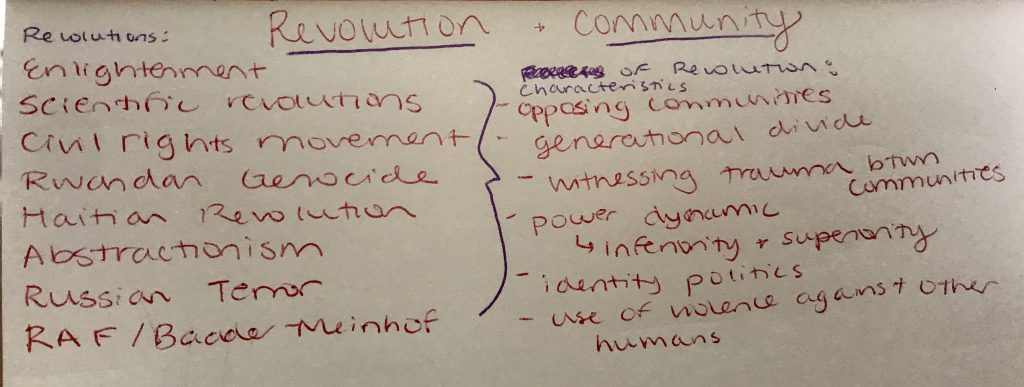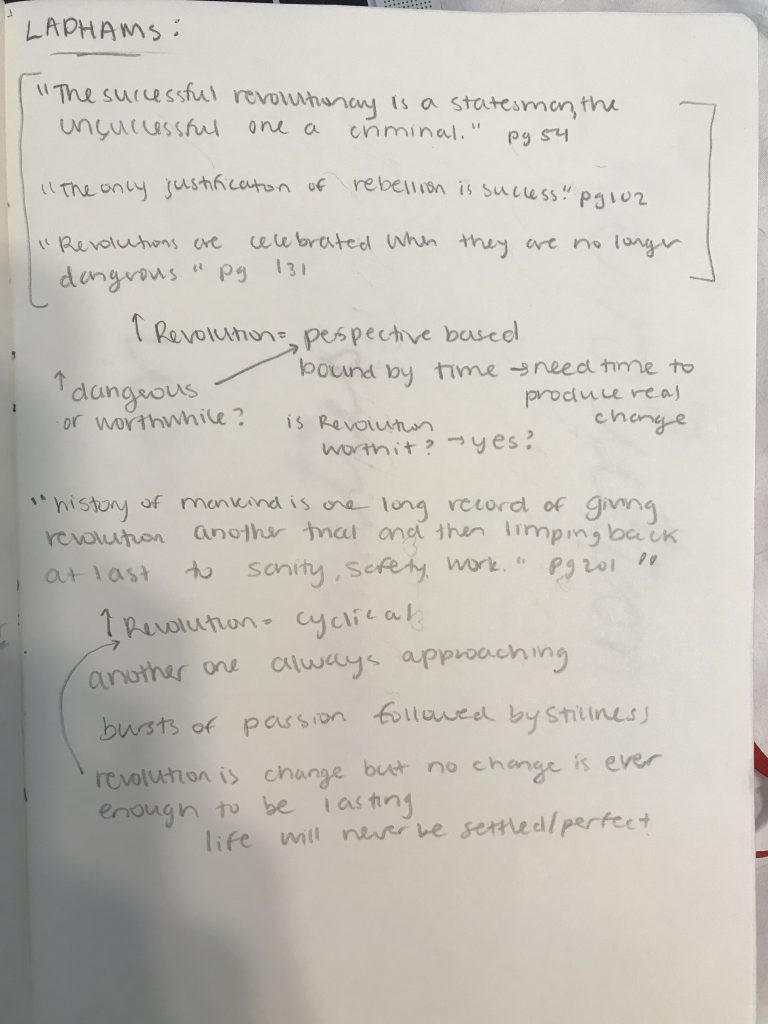Revolution
In looking to define Revolution, it appears unassailable. I’ve never participated in Revolution, so how can I say what a revolutionary spirit entails?
But, am I not also its indirect product? After millenia of proclaimed revolution: Neolithic, Copernican, Industrial, countless political uprisings in the name of freedom, the present is nothing if not shaped by these changes. In such a case, revolution looms, and the only certainty left becomes humankind’s inevitable search for change. Yet, revolution is assuredly distinguished from change. From unit two of this course, Thomas Kuhn’s understanding of Revolution refers to a change in paradigm–when the worldview that governs the observations one makes and the questions one has the capacity to ask is replaced by a new schema. Although he is addressing scientific revolutions, I posit that any time change is instilled and the underlying thought pattern of thought becomes obsolete and abandoned, Revolution has occurred.
Revolution, as my theme states, is guided by the work of community, and the two are inseparable. What is a paradigm shift besides the work and logic of one community grasping for power to eradicate another community’s pervasive dynamic. But, it seems revolution only occurs in the presence of such a power divide. For example, the Rwanadan Genocide, the RAF, the Civil Rights Movement, and the Hatian Revolution all fit within that box. This brings, for me, the question: Is it possible for multiple communities to exist without prompting the need for Revolution? How can communities exist in harmony?
While I’ve addressed this problem in my research paper, in terms of Revolution, it seems maybe harmony is not possible unless all parties put in the effort. So far, through history it seems as if disparate communities have not put in such effort, and have not witnessed one another’s pain. Thus, Revolution occurs to displace such pain. If communities were able to engage with one another without invoking notions of superiority and authoritative power, then Revolution might be unnecessary. Until such interactions are had, Revolution will continue to be used as a tool for rebalancing the scales of power, for helping an underrepresented community gain visibility.
Yet, in this pattern, following revolution is the inevitable dissatisfaction with a new power. The cyclic nature of revolution recurs as a well documented theme in Lapham’s Quarterly. E.W. Howe states: “The history of mankind is one long record of giving revolution another trial–and then limping back at last to sanity, safety, and work.” After a revolution, society, wounded by the prolonged fight for a new paradigm, returns to equilibrium. Yet, as only violence is used to settle power dynamics, these communities do not become proximate. Soon, the new dominating thought will be unable to satisfy everyone’s means of life. In Unit 3, we discussed the Rwandan Genocide. Prior to the genocide, Rwanda had been dominated by the Tutsis with the help of German, and later Belgian colonization. Yet, following Rwandan Independence in the 60s, the Hutus regained power and disrupted the centuries old power structure. Although this shift in mindset was a revolutionary change, it was not sufficient for the Hutus. Further shifts to eliminate Tutsis were desired–the genocide was a reaction to the dissatisfaction with the change provided by Revolution. Revolution will never be enough, the prevailing mindset will always leave something left desired, something to abandon. Revolution is cyclical, and society is ever-changing because we do not put in effort to witness one another.

